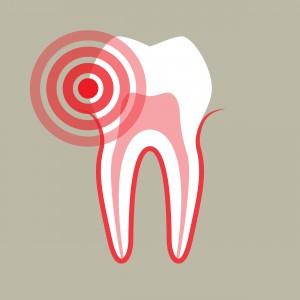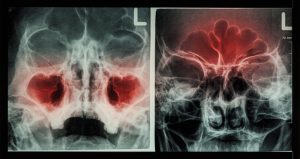 Toothaches can have many possible causes. Depending on the type of pain, your toothache could be due to tooth decay, an abscess, or even a cracked tooth. Often times, the type of pain you’re feeling could be indicative of what’s causing your toothache. However, toothaches can also be caused by grinding teeth at night or sinusitis, so the underlying problem might not necessarily be caused by actual damage to your teeth. Visiting your dentist for a toothache is always a good idea, but sometimes it isn’t possible to get an appointment as soon as you would’ve wanted. In those cases, there are still things you can do to relieve the pain somewhat.
Toothaches can have many possible causes. Depending on the type of pain, your toothache could be due to tooth decay, an abscess, or even a cracked tooth. Often times, the type of pain you’re feeling could be indicative of what’s causing your toothache. However, toothaches can also be caused by grinding teeth at night or sinusitis, so the underlying problem might not necessarily be caused by actual damage to your teeth. Visiting your dentist for a toothache is always a good idea, but sometimes it isn’t possible to get an appointment as soon as you would’ve wanted. In those cases, there are still things you can do to relieve the pain somewhat.
First Things First – What Type of Pain are You Experiencing?
As mentioned earlier, there are various things that could cause a toothache. Generally certain kinds of pain are more commonly associated with certain dental problems than others. If you could identify what kind of pain you personally are experiencing, it would help tremendously. That way you’d be approaching pain relief in a way that would more effectively reduce your pain.
Constant, Dull Pain in a Single Tooth

A constant, dull pain that might be worse when a tooth is exposed to extreme temperatures or you bite on it is often caused by an abscess.
If what you’re experiencing is a constant, dull pain that might be worse when a tooth is exposed to extreme temperatures or you bite on it, there’s a fairly good chance the pain is caused by pulpitis or an abscess. For this kind of pain, you can take over-the-counter pain medications such as ibuprofen while waiting to see your dentist. You should definitely see your dentist about this kind of pain as soon as possible.
A Throbbing Toothache in a Single Tooth
When the pain you’re experiencing is a pulsating pain that throbs almost as if it becomes more intense every time your heart beats, then it’s likely to be caused by decay, cracks or an abscess. Once again, ibuprofen is a good go-to medication for pain relief in this case.
For more natural remedies in both the case of a dull pain or a throbbing pain, you can also consider applying an ice pack wrapped in a towel to your cheek or using clove oil on the painful area.
Pain in Upper Teeth
Many patients complain about recurring pain in their upper teeth, especially their rear teeth. This pain is likely to be recurring and when it does occur, it’s usually in more than one tooth. One of the most likely causes here is sinusitis. When you have sinusitis, the pressure your sinuses exert on the nerves of your teeth can cause a really uncomfortable pain. If this is the cause, you’ll be able to relieve the pain simply by treating the sinusitis itself. Remember, you won’t necessarily have a blocked or runny nose when this happens, it’s possible for your sinuses to be swollen without those symptoms. However, if you find that the problem persists even after two or three days of treatment, it would be best to visit your dentist.

Many patients complain about recurring pain in their upper teeth, especially their rear teeth. One of the most likely causes here is sinusitis.
Sore Teeth and Jaw Muscles
If all your teeth hurt on a regular basis, there’s a good chance you suffer from bruxism, or teeth grinding. Patients who grind their teeth generally do so while they sleep, which can cause pain to be worse in the mornings. Symptoms of bruxism include pain that can feel like an earache at times, worn down teeth, and even a clenched jaw that won’t open in more extreme cases. Apart from this your teeth may often chip, or even become loose. People sharing a room with a “tooth grinder” often report hearing a loud grinding noise at night, often loud enough to keep them from sleeping themselves.
Bruxism is often more common in children than in other age groups, but it can affect anyone. While you may think that there’s not much to be done, it’s definitely advisable to book an appointment with your dentist or doctor if you suspect that you suffer from this. There are ways to combat damage to teeth caused by the grinding, such as the use of a prescription mouth guard to prevent teeth from getting worn down during sleep. Whatever you do, it’s not a good idea to leave this untreated, as the resulting damage can ruin an entire set of healthy teeth.
Whatever kind of toothache you might be experiencing, you should remember not to leave it untreated if it persists for more than two days. Always visit a dentist in the case of severe toothaches that don’t respond to home treatment, even if you suspect sinusitis may be the problem.
 Artistry and Expertise
Artistry and Expertise
Proper placement and esthetics are vital to the success of Dental Implants. Dr. Stone is a Prosthodontist, which means he has advanced training in tooth restoration. He teaches Dental Implant Techniques to dentists at two colleges in south Florida. We have an Onsite Laboratory, which assures excellent quality and cost effective care. Start with a Free Consultation, and we’ll help you with every step along the way to your perfect smile.



